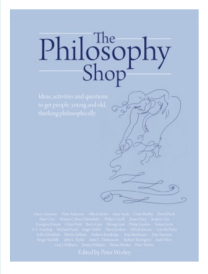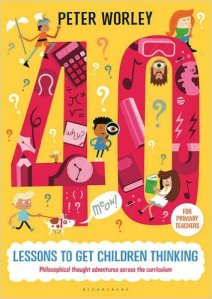First of all, a confession: I haven’t read a novel – just for pleasure – for years! I have read books though, but only non-fiction, conforming to the stereotype that men read most of the novels they ever read before the age of 25. The main reason for this (that I’ve identified anyway): ever-growing demands on my time and therefore an increasing need for efficiency. However, I’m not dead behind the eyes, I don’t read car maintenance manuals; I still yearn for escapism, good writing, imaginative worlds, making connections with writers and their special worldviews. At first I turned to short stories of which, and for many years, I have been a fan. As a philosopher I have always been drawn to the way short stories put at their heart – as Philip K. Dick said – not characters but ideas. And then I (re-)discovered poetry.
What philosophers (and anyone for that matter!) can learn from poetry.
Philosophers and teachers have a tendency to exorcise contradictions and paradoxes. If something doesn’t make sense then it needs revision. This is, to some extent, right. It is rational, after all, to try to make sense of that which makes no sense. But I have noticed that the best learning happens when there is contradiction. I’d like to give an example from a maths lesson I was involved in.
We were playing a game called Secret Number (see previous blog post by Andrew Day ‘mine do it already‘) in which there is an envelope in the middle of the room containing a number between (and including) 1 and 100. The children have only 10 questions that must be answerable with either ‘yes’ or ‘no’. The teacher keeps a note on the board of everything that’s inferred and the questions that were asked during the game, such as: ‘It is not even,’ (the question was: ‘Is it even?’) ‘It is not 4’, (question: ‘Is it four?’) ‘It is a double number,’ ‘It is odd,’ and so on. The children have to try to work out what the number is. There is a tendency for a teacher to try to deal with contradictions as the game goes on so that all the information is useful and that all the questions are not contradictory. But whenever I have played this game I have found that the best learning comes the more contradictions there are. So, even though the class did not guess the number, the after-game analysis was much more fruitful when the children could see where the problems were: ‘We didn’t need to ask if the number was 4 because we already know that it’s not even and 4 is an even number.’ If the teacher had said things like, ‘Do you need to ask that question?’ or, ‘Is 4 an even number? What does the board have on it about even numbers?’ during the game then the board would have ended up with no knots to untie.
Badly asked questions such as those you find in lateral thinking puzzle books are similar. It is easy to think that one shouldn’t ask a question to a class if it has been worded ambiguously but then you’d be missing the learning opportunity. Children are actually very good at unpacking badly worded questions. So, take this for example: how do you make this sum add up to 17?
8 + 6 =
The ‘answer’ at the back of the book is, of course: ‘by turning the sum upside down so that it reads 8 + 9 = 17’. But, as one 9-year-old-girl once said to me, ‘It’s not the same sum anymore, so the question’s wrong.’ A good point.
So what’s all this got to do with poetry?
Poetry welcomes the paradox, usually in the broadest sense: the paradox of what it is to be human. It welcomes the very thing good thinking tries to iron out and this is where poetry and good thinking come together. Take the poem Death is smaller than I thought by Adrian Mitchell. The paradox in this poem is clearly stated in the last three lines:
It is imaginary.
It is real.
It is love.
Not all poems make their paradox so explicit but very often they are there nevertheless. This makes an excellent starting point for thinkers: does the poem make sense? Is it understandable? Is it right? Is it how humans are? What happens to people when they die? How do we cope when people die? How are the last two questions related? And so on. Poems lead on to other poems too: after this, read Examination at the womb’s door by Ted Hughes or Transformations or To an unborn pauper child, both by Thomas Hardy.
Poems are also often quite short so they are perfect for busy teachers and busy classes where there is not much time to wade through novels. Poems are like cut diamonds in that they contain an infinite variety of complex reflections inside, all held within a beautifully shaped and formed outside. But I think the best analogy for what I’m saying in this piece is Doctor Who’s TARDIS: poems are paradoxical and much bigger on the inside.
Six poems with paradoxes
A good general principle for critically engaging with a poem is to ask (only when appropriate in the context of the poem as it is a general rule that all general rules have exceptions): ‘Do you agree with the poem/poet?’ or to take the main claim of the poem and turn it into a question: ‘What is the question?’ (Hamlet), ‘Are we the masters of our fate? Are we the captain of our souls?’ (Invictus), ‘Can anything happen? Can anything be?’ (Listen to the mustn’ts)
Death is smaller than I thought by Adrian Mitchell: this is the paradox of both believing and not believing that ones dead loved ones are still there.
An Owner’s Complaint by John Hegley – the paradox: a carrot is not a dog! However, it’s ‘answer’ poem, ‘My Dog is a Dog’ in the same collection My Dog is a Carrot, somewhat makes sense of the paradox. I use a paradoxical question with this poem: ‘When is a dog not a dog?’
Invictus by W.E. Henley – the paradox: how can we be ‘the captain of our soul’ if we are subject to chance?
Mind by Richard Wilbur – the paradox: the paradox of consciousness tries to find a simile.
Some Opposites by Richard Wilbur – the paradox of opposites: what exactly are opposites? Are they completely different or do they have something in common? What’s the opposite of opposite?
Listen to the mustn’ts by Shel Silverstein – the paradox: well, on one level it is not the case that anything can happen or be. So, what might the poet mean?
The Highwayman by Frederick Noyes – the paradox: why would you kill yourself for someone else. This one is even more paradoxical to children.
And finally, an original Thoughting by the author of this piece written especially for it:
The Contradiction Monster (or, the poem that ends before it’s begun!)
The contradiction monster
Is not like me and you
It does the strangest things, you know,
Things that we can’t do.
It tips its hat, says, ‘hello’
Then leaves as it arrives,
There’s a pair of shoes on its only foot;
It’s unmarried with seven wives.
The contradiction monster
Is not as it appears,
When it comes to dinner
It gets smaller as it nears.
A mother with no children,
He sings to them at night.
The contradiction monster’s wrong
Only when it’s right.
For how to run a poetry philosophical enquiry visit Pete’s blog here.
Peter Worley is CEO and co-founder of The Philosophy Foundation, the president of SOPHIA – the European foundation for doing philosophy with children and is currently a Visiting Research Associate at King’s College London. He has written 5 books on philosophy with children including a collection of poetry for thinking called Thoughtings (co-written with Andrew Day and published by Crown House) and his latest book Once Upon an If: The Storythinking Handbook (which includes a section on ‘Stories in Verse’ and is published by Bloomsbury).
 “As the weeks have progressed I have noticed real improvements in regards to how the children respond to one another when they disagree and the quieter children are really beginning to ‘find their voices’. One particular child who finds writing a real struggle due to language barriers was so inspired following a poetry session that he sat and wrote a mainly phonetically correct poem of his own!”
“As the weeks have progressed I have noticed real improvements in regards to how the children respond to one another when they disagree and the quieter children are really beginning to ‘find their voices’. One particular child who finds writing a real struggle due to language barriers was so inspired following a poetry session that he sat and wrote a mainly phonetically correct poem of his own!” For this World Poetry Day, download and use this free resource taken from one of our multi-award winning books The Philosophy Shop, to get your children writing some philosophical poetry of their own.
For this World Poetry Day, download and use this free resource taken from one of our multi-award winning books The Philosophy Shop, to get your children writing some philosophical poetry of their own.







